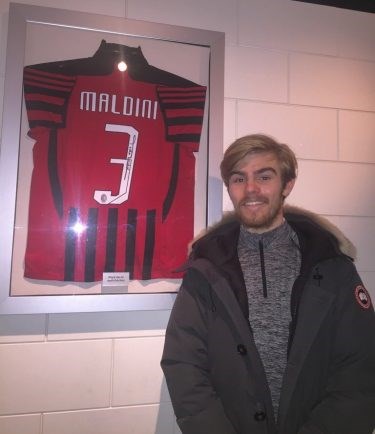A selection of leading sports journalists gathered in Manchester at the beginning of September for a week of debate at the annual Football Writing Festival. Max Carlyle, a BA (Hons) Football Business & Media student at UCFB Etihad Campus, attended the Festival and enjoyed a range of talks on the hottest topics – including the World Cup, the managerial merry-go-round and how to break into the industry – with some of the world’s most popular and respected football and sports journalists.
Max was ever present over the six days, and reported back on highlights for each session. Read on to find out more…
Follow Max on Twitter.

After a weekend of fixtures, the Football Writing Festival 2018 changed venue, hopping across the city to Hotel Football. Owned by former players from Manchester United’s Class of 92, the nine-storey hotel could not have provided a more apt scene – overlooking Old Trafford and the landscape of Manchester.
As it was the turn of world renowned sports data provider Opta to sit on the panel, the night was full of articulate discussion and debate on the evolution of the dialect of football and how it has become intellectualised over time.
The discussion was led by Daniel Storey (author of Gazza in Italy), Duncan Alexander (author of Outside the Box), Peter Staunton (of goal.com), Tom Williams (author of Do You Speak Football?) and Michael Cox (author of The Mixer). The ice-breaking question of the evening enquired about the favourite footballing phrase of each member of the panel. Staunton answered with “hospital ball”, Alexander went for “there are no easy games” (as he bluntly pointed out, there are!), Williams opted for the Finnish expression of a holding midfielder; a “fecal plug”, which derives from the population of bears in Finland. Cox expressed his admiration of theatrical metaphors such as the Community Shield being heralded as a “curtain raiser” and “dress rehearsal.”
Staunton was quick to point out that: “As the inventors of the game, so much of the terminology in football has its basis in English, which, as the global language, lent itself to the global game.” Williams responded to this by questioning just how limited the English are for technical expressions. He said: “The Rabona comes from Argentina; there was a conscious, deliberate drive in the 1950s in Italy; and there are many different ways to name a flick in French.”
Storey outlined that the lack of English football vocabulary may be down to English football not developing in style for the best part of “50 or 60 years”, and also a consequence of foreign players being banned from playing in the country until 1973. Alexander agreed: “Attempting a Rabona in a match in England is often seen as overcomplicating, and scoring a Panenka penalty is seen as offensive to a goalkeeper.” Cox elaborated on this, explaining: “There is inherent conservatism and anti-intellectualism in the English game. Players have roles named after them – the ‘Sheringham role’, the ‘Makelele role’ – these are common positions in the rest of the world.”
With football vocabulary becoming more complex, Williams explored how headlines are now always “something that someone has said in a press conference rather than what happened on the pitch. Managers often use the obsession of the football soap opera to their advantage”. Alexander used the example of how the “Special One” now defines Jose Mourinho along with many of the other terms of his invention. Cox simply answered: “It plays into his hands; sometimes you don’t get a good answer from a technical question.”
The foreign influx of talent over the last two decades was adjudged to have greatly influenced the British game. Williams used the examples of Cantona, Zola and Bergkamp, showing there are different ways to play as a centre forward. He then went on to explain the origins of the “fox in the box”. He said: “It came from Thierry Henry, who told the French press Arsenal lacked a player similar to Michael Owen after the 2-1 loss in the 2001 FA Cup final. As English press asked their French colleagues for a rough translation of Henry’s words, the closest appropriation would be ‘fox in the box.’”
Alexander provided an in-depth explanation of the new “xG” metric which is breaking new ground in the sport, and how the rise of Monday Night Football is largely down to Gary Neville and Jamie Carragher’s analysis, which has had “a massive effect on how we talk about football”.
From opinions on fan channels to the expected demise of the match report due to the universal broadcasting of football, this is just a snapshot of the wide array of topics that found their way into a thoroughly brilliant evening with an inspiring panel.
















